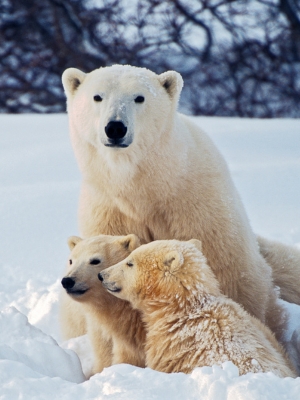We are pleased to report progress in the rehabilitation of two of our residents: Carly and Ollie.
As you may recall, Carly is a snow monkey who came to the Sanctuary in early 2005. She had been forced to spend years as a “pet,” living in social isolation, away from others of her kind, before being confiscated by Animal Control in Nevada. She had been severely neglected and was kept in a cage in a garage.
[teaserbreak]
Since her arrival at the Sanctuary, Carly has lived alongside other snow monkeys and we observed her for any contact and interaction with the others. Despite having social contact with some of these other individuals, she did not “click” with anyone in particular. Attempts at an introduction were unsuccessful due to aggression. A more recent introduction, however, has proven to be more promising. Carly was recently placed with two other snow monkeys, a male and a female called Jerry and Chessie. The three of them now live together in a complex, semi-natural enclosure comprised of multiple living areas; so far, their interactions have been positive. Carly appears to be enjoying the companionship of the pair and, in particular, the attention of Jerry, the male.
Like Carly, Jerry and Chessie are also ex-“pets.” They were apparently bought over the Internet as adult monkeys, but were too difficult to handle so were “donated” to the Sanctuary. Both display disturbed behavior, in particular Chessie, who self-mutilates, biting her arms and legs.
Plans are under way to move the three to a larger semi-natural enclosure that will provide them with more ground space and height.
In the Summer 2005 edition of Animal Issues, we reported on the arrival of Ollie, who had been raised as though he was a child in an all human household. Ollie, a seven-year-old snow monkey, displayed dysfunctional behavior typically seen in an ex-“pet,” including slapping himself in the head with his hind feet, albeit gently. He also behaved in an unpredictable way with humans.
Ollie spent his first few months at the Sanctuary living next to two other snow monkeys called Oscar and McKenzie. Oscar is 15 years old. He was a former “pet” who arrived at the Sanctuary in 2001. Despite being on his own for many years prior to coming to the Sanctuary, he now lives with McKenzie, who is eight years old and also was a former “pet.” The pair has developed a close relationship and can often be seen wrestling and playing with each other.
Oscar is dominant and aloof and likes to know that everything is the way he wants it. If he isn’t happy with the food given to him, he picks it up and tosses it over his shoulder. He takes a keen interest in what is going on around him and is very protective of McKenzie.
After noticing that there was positive interaction between Ollie and McKenzie, we introduced Ollie to the pair of them. Despite the potential for social bonding, we were concerned that Ollie, as a timid and low-ranking individual, might be bullied in this new situation.
The first day of the introduction was carefully monitored by staff. Oscar appeared indifferent to the appearance of Ollie in the pen, whereas McKenzie made an immediate effort to establish dominance by chasing and behaving roughly towards Ollie. Fortunately, this behavior did not last and McKenzie soon started to groom Ollie. They have subsequently established a close bond and can regularly be seen chasing each other and play-fighting. Ollie appears to be less timid around his new mates. It is wonderful to see him interacting with others of his kind after all those years of solitary confinement.
Nonhuman primates are highly social animals and require the companionship of others for their psychological and emotional well-being. Some ex-“pets” are so dysfunctional that they may never be able to form social groups with others of their kind. Such is the tragedy of making “pets” out of wild animals.
We are hopeful, however, that Carly, Jerry, and Chessie and Ollie, Oscar, and McKenzie will benefit from the formation of these social groups, and we will keep our supporters apprised of our continued work to rehabilitate these individuals.
 Dear Reader,
Dear Reader,